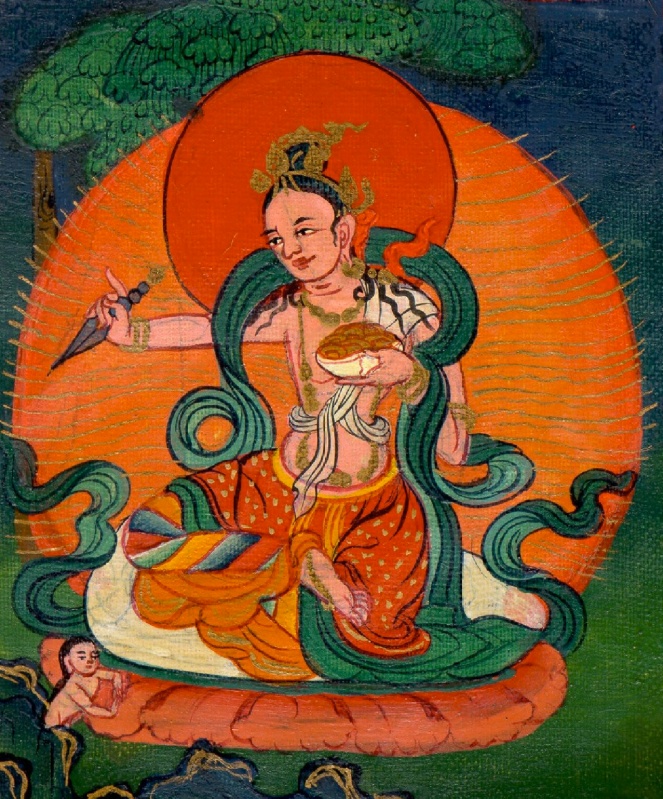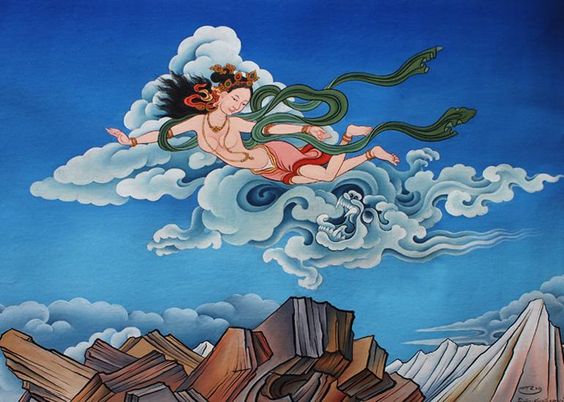
“Male or female–there is no great difference. But if she develops the mind intent on enlightenment, to be a woman is better.” -Guru Padmasambhava.
“It is time we truly recognize that the era of the hunter is past. This should be a more “feminine” era – an era when women make greater contributions to society. If we continue to devalue what women have to offer, we will continue harming women and continue overlooking and devaluing these virtues that are considered “feminine.” And these are precisely the virtues that the world needs more now.”—17th Karmapa, Orgyen Trinley Dorje
For International Women’s Day (March 8th) today am re-posting links to all the articles and translations have published so far on this website related to women. There are two pages on the website dedicated to all things and people female and feminine. As this is a subject very close to my heart (and body), I intend to do more work on such topics, with a new article coming up soon. For now, here is a review of the body of work done so far. Enjoy!
May women’s equal role in the four-fold Buddhist sangha be restored. May female teachers, practitioners, translators, lineage holders flourish! Let’s unite as women of all races, creeds, colours and countries and like Noble Tara support and help each other as sisters, daughters, mothers and more with love and compassion on our paths to full awakening!
Music? I’m Every Woman by Chaka Khan.
Adele Tomlin, 8th March 2022
1) THE FEMALE PRINCIPLE
This section of the website contains articles, research or texts that are specifically related to issues connected to gender, sexuality and females in Buddhism. Topics covered include making visible the unsung heroines and invisible women of Buddhism, Vajrayana and tantra; the Dakinis and female teachers of male Mahasiddhas; male power and misconduct and misogyny towards women and its connection with monasticism and power; Dakini script and its symbolism and meaning in treasure-revelations; the great importance of love, consent and respect for women in Vajryana tantric practice and unions; the heterosexual norm of tantric unions; the outstanding activities related to women by the 17th Karmapa; the meaning of ecstasy and bliss in tantra and more.
DAKINI SCRIPT (Khandro Da-yig): Mysterious Symbolic Key to Hidden Treasures
THE ‘MOTHER OF WISDOM’: Pictures, poems and songs on Mother’s Day!
‘Yeshe Tshogyel Guru Yoga‘ by 15th Karmapa
The male-female tantric union: Homophobic heteronormativity or biological inner essences?
Tantric Buddhism, Sex and Women: the Importance of Love, Respect and Consent
Ultimate ‘ecstatic union’: the meaning and role of ‘erotic bliss’ in tantra and Kālacakra
 Yeshe Tsogyel
Yeshe Tsogyel2) FEMALE LINEAGES AND TEACHERS
The second website page is dedicated to new research and translations connected to female teachers (past and present) and female lineages/female-founded practices, such as Maya (Buddha’s mother), Prajapati (Buddha’s Aunt and Step-mother), Arya Kshema (one of Buddha’s first main female disciples), Utpalavarṇā (c. 250 BCE) (another of Buddha’s main female disciples and first to greet Buddha on Lhabab Duchen), Princess Lakṣmīṅkarā, Yeshe Tsogyel, Princess Mandāravā, Achi Chokyi Drolma (grandmother of the founder of the Drikung Kagyu), Chinese empresses, Gelongma Palmo (founder of the practice Nyung Ne), Machig Jobum, Machig Labdron (founder of Chod), Milarepa’s female disciples, Kunzang Trinley Wangmo (Zhentong lineage holder and consort of Taranatha), Jomo Menmo, the Sakya Jetsunmas, Khandro Rinpoche (the 15th Karmapa’s consort and dakini of Tsurpu), and Freda Bedi (the first female translator for the Karmapas).
In 2013, the Larung Gar nunnery in Kham, Tibet published a 16-volume collection/anthology of Indian and Tibetan women’s biographies, ‘Phags bod kyi skyes chen ma dag gi rnam par thar ba padma dkar po’i phreng ba, and this is something I hope to do more work on too.
(Listed Alphabetically)
Achi Chokyi Drolma (11th Century)
Arya Kshema (c. 250 BCE)
Chinese Empresses
Freda Bedi (20th Century)
Gelongma Palmo (11th Century)
Jetsunma Tenzin Palmo (20th-21st Century)
Jomo Menmo
Machig Jobum
Machig Jobum: Female mahasiddha and lineage holder of Dro Kālacakra
Machig Labdron (12th Century)
Mandāravā (8th Century)
NEW TRANSLATION: ‘Praises to Mandāravā’ by Jamyang Khyentse Wangpo
Maya, Buddha’s Mother (c. 250 BCE)
Rechungma and Saley O – Milarepa’s female disciples
Rechungma’s Song of ‘Fifteen Realisations
A Girl’s Lament: Songs of Saley O to Milarepa
Khandro Rinpoche – 15th Karmapa’s consort (21st Century)
Kunzang Trinley Wangmo (16th Century)
Prajapati – Aunt of Buddha and first Bikshuni nun (c. 250 BCE)
Princess Lakṣmīṅkarā
Female Teachers of Mahasiddhas Saraha and Tilopa
Mahāsiddha Tilopa: ‘Ḍākinī’s Instruction to Tilopa on the Bardo‘
Sakya Jetsunmas
EMANATIONS OF VAJRAYOGINI? THE SAKYA JETSUNMAS, A FEMALE FAMILY LINEAGE
Utpalavarṇā (c. 250 BCE)
Yeshe Tshogyel (8th Century)
‘Yeshe Tshogyel Guru Yoga‘ by 15th Karmapa
Yeshe Tsogyel’s Descent to the Hell Realms and How She Got Her Name



Happy International Woman’s Day, Dear Adele! I hope you are doing well.
Thank you for this sharing. I look forward to checking out these links.
Peace, Love and Harmony to you and yours!Paul
Thanks dear Paul! Am doing fine thanks, and you? Hope you get benefit, wisdom and joy from reading them